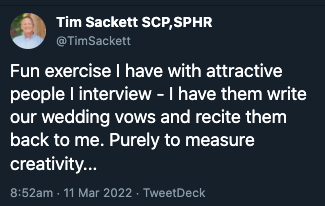I have at times in my career been a part of teams where each day I laughed. The team was a joy to work with and while we still had work and stress, we found times to laugh. I had a group of folks I worked with in Omaha, NE that I specifically recall laughing so hard each week that my stomach hurt, sometimes daily!
I’m not known professionally as someone who is frequently serious. I joke a lot. I love humor and making fun of all the dumb stuff we do. It’s how Kris Dunn found me and I started my blogging career over a decade ago at Fistful of Talent. My entire job was to make people laugh on a Friday.
This past week I posted this tweet on Twitter:

Now, if you know me, you know this is a joke. If you don’t know me, but you spend twelve seconds looking at my feed, you know this is a joke.
Way too many people thought this tweet was serious and took offense to it!
Let’s dig into how strange it is that someone would believe this was an actual exercise I would do professionally:
- Your on Twitter and you see this guy with 40K+ followers say he makes candidates write wedding vows and recite them back to him, and you immediately think to yourself, “Well, that’s not good! Why would he ever do that! I must comment! This offends me!”
- At this point, you’re eihter clinically naive or flat out stupid.
- What’s the offense you ask? “Well, if you only do this with “attractive” people, you have BIAS!” Okay, I’m listening, but understand, we all judge attractiveness in our own ways. Someone I might find attractive, you might find ugly. So, you’re fighting for a view that is nebulous at best. There was no gender attached to the tweet, so if you think that I’m talking about females, now you are showing your own bias. Maybe in this clearly hypothetical exercise I only do this with attractive men, or attractive non-bianary people!
- The joke is really around the concept of an interview and wedding vows. That’s what makes it funny. Imagine being asked to write wedding vows to someone you’re interviewing with and then reciting them, in a sense, actually getting married in an interview? Which is in a sense what interviewing is all about, do I want to spend the rest of my life with this company.
- Foks were beside themselves that I would actually have someone do this. They were OFFENDED! Of course, I would never actually do this, it was always a joke. And if I can pat myself on the back (which I love to do!) it was really well written! It was tight. Not overly wordy. It was, what I thought, fairly innocent, so clean fun in the workplace. It also made fun of crazy interview questions and exercises we make candiates jump through. All in 26 words.
Where are we at with Humor in the Workplace?
We are in a very strange place.
I grew up in my career where very offensive jokes were told in the workplace all the time. Stuff that would get you immediately fired and most likely canceled today. Thankfully, most of us are away from most of that today.
Today, we can basically have humor around very certain topics and can only be told by very certain people. The vehicle of humor is very important in today’s world. Here’s kind of how it’s broken down:
- People of the same gender, ethnicity, etc. can fun of each other, to each other.
- White dudes can make fun of white dudes, but nothing else. (Oh, there it is, Tim’s Fragility is showing!)
- Everybody else can make fun of white dudes, and their own identifiers.
- We can all make fun of people and things we’ve deemed culturally fair game – Putin, Kanye, Trump, old white men, Dudes getting yelled at by their spouses, the CEOs of big companies – but only the bad ones, not the ones we like, etc.
- You can’t make fun of anything someone would ever, at any time in histroy, find offensive in any slightest way. Like the color purple. “OMG! TIM! Purple stands for safe spaces for puppies! How could you!”
- You can always make fun of yourself! (hat tip: Patricia in the comments)
We right ditched, left ditched humor in the workplace, and in many cases socially as well. I hated that people in the workplace could feel attacked by what someone would consider ‘humor’ early in my career. I also hate that humor Nazis are now the norm in our lives believing they can regulate everything that can be considered humorous.
There’s a fine line with humor in the workplace and that line has gotten even thinner in recent years. The problem with humor Nazis is that many employees want to work in environments and cultures that include humor. They want to laugh each day. it helps with engagement. Of course, that humor must be appropriate.
Maybe we just have the dial turned so far up on our offensive meter we struggle to even recognize humor anymore. The best part of this is all those who found my tweet offensive would also say they love humor, just that I’m not funny, and nor was my tweet. That’s their right for sure, but I would argue they’ve lost context around what’s funny.

